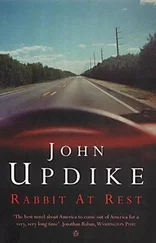Fighting panic, Ahmad tries the big door, the sliding door. It has a handle down low that when turned makes two rods release a pair of side latches. The handle turns; the door shocks him by sliding up with a counterweighted ease that feels like flight, a curved moment of flight before it settles rattlingly into its rails above, in the gloom near the ceiling.
Ahmad has let light into a cave. Charlie is not inside the grimy space, nor are the two operatives, the technician and his younger support. The workbenches and pegboards are just as Ahmad remembers them. The litter and drifts of discarded parts in the corners seem less than before. The garage has been cleaned up, tidied toward some finality. There is a hush as of a tomb that has been robbed the last time. The traffic in the alley throws into the cave dangerous flickers of reflected light; passersby idly glance in. No one is here but the truck is here, die boxy GMC 3500 unprofes-sionally hand-lettered Window Shades Systems.
Ahmad opens the driver's door gingerly and sees that the military-drab box still sits there between the two seats, duct-taped to the milk crate. The ignition key dangles from the dashboard, inviting an intruder to turn it. Two thick insulated wires still trail from the detonator into the truck body. The access door, no higher than a crouching man, slides open only six inches before the wires threaded through it begin to pull tight. Through the six-inch opening Ahmad smells the mixture of ammonium-nitrate fertilizer and nitro-methane racing fuel; he sees the ghostly-pale plastic drums, each as high as his waist and each holding one hundred sixty kilograms of die explosive mixture. The glossy white plastic of the containers glimmers like a species of flesh. Spliced yellow wires loop from the blasting caps, enhanced by aluminum powder and pentrite, which are embedded in the bottom of each drum. The twenty-five containers, he can make out in the shadows, have been arranged in a five-by-five square, neatly roped together with doubled clothesline and secured against sliding by taut attachments to the cleats and side bars within the truck body. The whole constitutes a work of modern art, assiduous and opaque. Ahmad remembers the squat technician, the dainty smooth gestures of his oil-tipped hands, and imagines him smiling, gap-toothed, with a workman's innocent pride. They are all, all in this scheme, parts of a beautiful machine, fitted one against another. The others have vanished but Ahmad remains, to put the final piece into its place.
Gently he slides back the little wooden door, restoring the array of loaded plastic drums to their fragrant darkness. They have been entrusted to him. Like him, they are soldiers. He is surrounded by fellow-soldiers even though they have gone silent, leaving no instruction behind. The door at the back of the truck has been padlocked. The big hasp has been swung over and its slot closed over the thick protruding staple and a heavy combination padlock snapped shut there. Ahmad has not been told the combination. He understands the message: he must have faith in his brothers, just as they have faith in him, in their unexplained absence, to proceed with the plan. He has become the surviving lone instrument of the All-Merciful, the Perfect. He has been provided with a truck the twin of one he habitually drives, to make his path straight and smooth. Tentatively, he sits in the driver's seat. The old imitation black leather feels warm, as if just vacated.
An explosion, he remembers from his physics class at Central High, is simply a solid or liquid being rapidly turned into a gas, expanding in less than a second into hundreds of times its former volume. That is all it is. As if from the rim of such an impassive chemical event he sees himself, small and precise, climb into the unaccustomed truck, start the engine, rev it gently, and back it out into the alley.
One small thing nags. Getting out to lower the rattling garage door behind them-him, the truck, and the invisible company of his collaborators-Ahmad feels the juice of the breakfast orange and a suppressed nervous excitement press upon his bladder. He had best lighten himself for the journey ahead. He parks the truck, with its motor idling, on one side of the alley, raises the garage door again, and finds the machine shop's toilet behind a smirched unmarked door in a corner beside the workbench and the pegboard. There is a string that turns on the naked bulb, and a bright porcelain receptacle with an oval eye of dubious water to be flushed when he is done adding the little stream out of himself. He washes his hands scrupulously, using the dispenser of grease-cutting detergent in readiness on the sink. He returns outside and pulls down the rattling door on its knotted cord and realizes with an inner lurch how foolish and dangerous it had been to abandon the truck, its motor running, even for a minute or two. He is not thinking normally, in this exalted yet thin atmosphere of last things. He must keep his head level by conceiving of himself as God's instrument, cool and hard and definite and thoughtless, as an instrument must be.
He consults his Timex: it says eight-oh-nine. Four more minutes lost. He rolls the truck forward, trying to avoid potholes and sudden starts and stops. He is behind the schedule that he and Charlie set, but by less than twenty minutes. Calmer now that the truck is moving, part of the flow of the daily traffic of the world, he turns right out of the alley and then left on West Main, passing again the Pep Boys, with its disturbing cartoon image of three men, Manny, Moe, and Jack, conjoined in one three-headed dwarf body.
The fully awakened city twinkles and swerves around him. He imagines his truck as an encircled rectangle in a helicopter view of a car chase, threading through the streets, stopping at lights. This truck handles differently from Excellency, which had an easy sway to it, as if the driver were sitting on the neck of an elephant. Driving Window Shades Systems, he feels no organic sympathy. The steering wheel doesn't fit his hands. Every irregularity in the road surface jars the whole frame. The front wheels persistently tug to the left, as if some accident left the frame bent. The weight- twice what McVeigh had, greater and denser than any load of furniture-pushes him from behind when he brakes at a red light and holds him back when he pulls out on green.
To avoid the center of the town-the high school, the City Hall, the church, the lake of rubble, the stubby glass skyscrapers supplied as sops by the government-Ahmad turns on Washington Street, called that because, Charlie had once told him, in the other direction it goes by a mansion the great general used as one of his New Jersey headquarters. The jihad and the Revolution waged the same kind of war, Charlie explained-the desperate and vicious war of the underdog, the imperial overdog claiming fouls by the rules he has devised for his own benefit.
Ahmad punches on the dashboard radio; it is tuned in to an obnoxious rap station, spouting unintelligible lewdness. He finds WCBS-AM on the dial and is breathlessly told that traffic on the helix into the Lincoln Tunnel is a logjam as usual, stop-and-go, ho-ho-ho. Rapid chatter from a helicopter and rackety pop music follow. He punches the radio off again. In this devilish society there is nothing fit for a man in his last hour to hear. Silence is better. Silence is God's music. Ahmad must be clean, to meet God. An icy trickle high in his abdomen reaches his bowels at the thought of meeting the other self, as close as a vein in his neck, that he has always felt beside him, a brother, a father, but one he could never turn to confront directly in His perfect radiance. Now he, the fatherless, the brotJierless, carries forward God's inexorable will; Ahmad hastens to deliver Hutama, the Crushing Fire. More precisely, Shaikh Rashid once explained, Hutama means that which breaks to pieces.
Читать дальше












